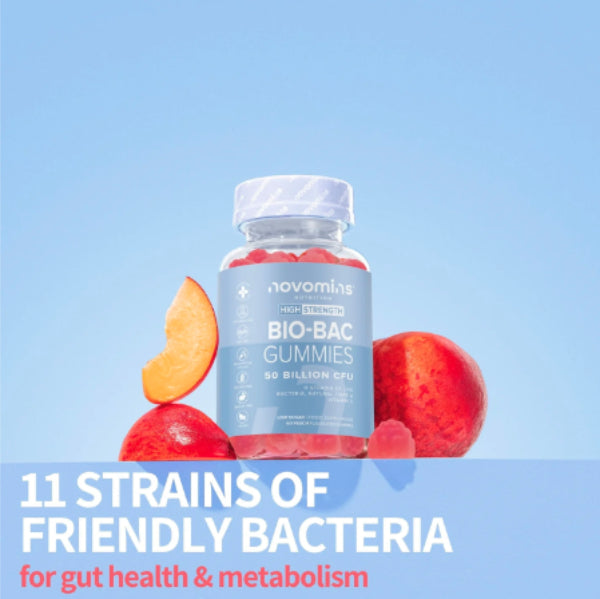Does your belly feel full and tight? Feeling more gassy than usual? Does your stomach often rumble and make funny noises? Bloating might be the cause.
While no one can entirely escape the dreaded bloat (it happens to us all), some may experience it more than others. In fact, studies show that up to 18% of the general population experience bloating at least once a week — and it’s far from a trivial condition.
The good news is that bloating can usually be managed and treated with simple, proactive lifestyle and dietary changes—including probiotic supplements in one’s diet has been proven to help!
Below, we’ll explore the correlation between probiotics and a reduction in bloating, understand which bacterial strains are best for bloating, and advise on other tips and ideas that can help.
The science behind how probiotics work
First things first, what are probiotics?
Three types of bacteria live in the gut: good, bad and opportunistic. The good bacteria keep the bad bacteria, responsible for chronic diseases, in check.
Probiotics are composed of good bacteria and yeasts that help your digestive system, keeping the gut healthy and boosting your immune system against infections.
You can find probiotics naturally in food like kefir, sour cream, sauerkraut and kombucha, as well as supplements like Novomins Bio Bac Gummies (these gummies contain 50 Billion CFU – a world first!).
Once consumed, the bacteria strains in the probiotics make their way into the small and large intestines. From there, they help restore the natural balance of bacteria if it’s been disrupted by factors such as illness, antibiotics, stress, lack of sleep, excessive alcohol consumption or a poor diet.
The live microorganisms in the probiotics start multiplying and competing with the harmful bacteria in the gut for space and food sources. This starves the bad bacteria and creates an uninhabitable space for them to live in.
Thanks to the acids they produce, probiotics also improve the gut's environment, discouraging bad bacteria from growing.
When it comes to improving and managing digestive disorders – including symptoms of IBS – probiotics play a significant role. Many individuals take them to alleviate stomach pain, diarrhoea, antibiotic-associated diarrhoea, constipation and bloating.
Some evidence also suggests probiotics help with upper respiratory infections and improve symptoms of anxiety and depression due to the gut-brain axis.
Why is gut health important?
If you’ve ever heard the term brain-gut connection, you’ll know just how vital gut health is to your overall well-being. Put simply, if you don’t have a healthy digestive system, you’re not healthy.
Your gut’s primary function is to break down and absorb nutrients from the food you consume to help support your body. But when this gets disrupted, it can lead to malabsorption and a whole host of other problems, including heartburn and weight gain or loss.
Did you know that a staggering 80% of your immune system resides in your gut? This means that if your gut isn’t healthy beyond obvious gastrointestinal conditions like IBS and chronic bloating, your immune system is weakened. As a result, it can't function properly, making you more susceptible to illnesses.
Poor gut health is also considered a risk factor for autoimmune disorders like Hashimoto’s or Coeliac disease.
What’s more, your gut could even affect the health of your brain. Alterations in the gut microbiome can trigger mood changes and are linked to a range of immune-related neurological disorders. That’s why you should think of gut health as the foundation of everything.
How gut health affects bloating
Experiencing occasional bloating is extremely common and doesn’t always indicate something’s wrong. However, chronic bloating, which is painful and affects your day-to-day life, could be your body’s way of signalling that your digestive health could do with some TLC.
When bacteria in your gut become imbalanced, it’s common to experience bloating symptoms like excess gas. A common cause of bloating due to poor gut health is constipation. When stool stays in the colon for too long, bacteria have more time to ferment, resulting in more gas. Other common causes include diarrhoea, gut sensitivity, gastroparesis and SIBO.

Do probiotics help with bloating?
There are a wide range of triggers for bloating, such as excess gas caused by swallowing air when eating too quickly, drinking too many fizzy drinks, and diet. Other reasons include food intolerances, infection, constipation and IBS.
Taking probiotic pills can help with bloating as they introduce healthy bacteria into your gut.
Let’s take a look at a few scenarios where probiotics can help.
Do Probiotics Reduce Belly Bloat?
While there is evidence that probiotics can support gut health, there is some dispute about whether probiotics can help with a bloated stomach.
Some studies suggest that probiotics can increase gas production and bloating. However, many attribute this as a temporary side effect while your gut gets used to the new bacteria that’s been introduced.
If you’ve been taking probiotics for a while and find yourself feeling more bloated, it’s best to use an alternative formula that has a lower count (CFU) or stop supplementation altogether.
On a side note, if you feel bloated in the morning, read our guide "Waking Up Bloated: Causes, Treatment & More" to find out more.
Do Probiotics Help with Bloating and Gas?
If you experience frequent bloating or simply want to enhance your gut health, probiotics can help with bloating and gas.
They introduce good bacteria into the gut, which helps alleviate symptoms such as excess gas, particularly on days when you're feeling gassier than usual, like after a large meal.
Do Probiotics Help with Bloating and Constipation?
Research reveals that probiotics can help treat constipation, a leading cause of bloating. Those who consume probiotics, either via supplements or fermented foods, can increase their chance of bowel movement by up to 10%.
Other studies suggest that efficacy depends on the strain of bacteria. Lactobacillus casei Shirota and Bifidobacterium lactis strains were found to be best for increasing bowel movements and helping combat constipation symptoms.
Do probiotics help with bloating and IBS?
rritable bowel syndrome (IBS) is a common condition with a range of symptoms that include bloating, constipation, diarrhoea and painful stomach cramps.
While the exact cause of this condition remains unknown, it can develop after bacterial or parasitic infection of the intestines or due to an imbalance in the gut microbiome.
There has been a lot of research into the therapeutic potential of probiotics in GI disorders like IBS. One study showed probiotics may improve IBS-related bloating and overall symptoms by reintroducing friendly bacteria back into the gut.
Which probiotic is best for bloating?
|
Probiotic Strain |
Key benefits |
Uses |
Natural food sources |
|
Bifidobacterium |
Digests fibre, prevents infections, produces healthy fatty acids and B vitamins |
Helps with IBS, GI disorders, infections, bloating and constipation |
Kimchi, miso, pickles, sauerkraut, sourdough, bread, kefir, some vinegar and wines |
|
Lactobacillus |
Improves symptoms of bloating-causing GI diseases, prevents intestinal damage, improves lactose intolerance |
Treats diarrhoea, eradicates Helicobacter pylori bacteria, helps with IBS, prevents bacterial overgrowth in the vagina |
Tempeh, kefir, cottage cheese, kombucha |
|
Akkermansia |
Improves immune and metabolic health, breaks down fibre |
Reduces bloating, promotes stool movement |
Onions, garlic, bananas, cauliflower, broccoli, leeks, Brussels sprouts |
|
Bacillus coagulans |
Produces lactic acid in the gut, reduces constipation and GI symptoms like gas and stomach pain |
Reduces constipation and gastrointestinal symptoms, helps with diarrhoea |
Yogurt, sauerkraut, kimchi |
|
Saccharomyces cerevisiae |
Treats GI tract disorders like diarrhoea, antifungal, promotes growth of normal gut flora |
Treats diarrhoea and GI tract disorders |
Lychee, kombucha, some dairy products like kefir |
Bifidobacterium
Bifidobacterium, also known as B.bifidum, is a probiotic that lives in the intestines and produces acetic and lactic acid in the gut. This probiotic strain helps the gut digest fibre, prevent infections and produce healthy fatty acids and B vitamins.
While it’s incredibly important for the body, B.bifidum makes up less than 10% of gut microbiota.
Bifidobacterium strains are often taken by those with IBS and are thought to prevent and treat a wide range of gastrointestinal disorders, including infections and even cancers.
They can be especially helpful for bloating as this strain can increase bowel movement. That means less constipation and less time for bacteria in the stool to ferment and produce uncomfortable gas.
Aside from supplements, there are many natural food sources containing bifidobacterium, including kimchi, miso, pickles, sauerkraut, sourdough bread, kefir, and some vinegar and wines.
Lactobacillus
Lactobacillus, commonly known as L. acidophilus, is another type of friendly bacteria that lives in the intestines, mouth, and the vagina.
Research has shown that this probiotic strain can improve the symptoms of bloating-causing GI diseases and prevent intestinal damage caused by bacterial infections. In fact, lactobacillus may even hinder the development of infections, stopping pathogenic bacteria that produce extra gas.
Lactobacillus also helps with lactose intolerance and regulates immunity while breaking down food, aiding proper nutrient absorption.
Commonly used to treat diarrhoea, lactobacillus is frequently used to remove Helicobacter pylori bacteria, which can cause peptic ulcers and gastritis, well known for causing belching and bloating. Other uses for lactobacillus include preventing IBS symptoms and bacterial overgrowth in the vagina.
You can find L.acidophilus in dietary supplements like Novomins Women’s Bio Balance Gummies and food sources like tempeh, kefir, cottage cheese and kombucha.
Akkermansia
Akkermansia is a type of probiotic that lives in the mucus layer of the intestine. Associated with improved immune and metabolic health, it’s found in healthy adults and infants and accounts for 1-4% of gut bacteria.
Akkermansia breaks down a sugary protein called mucin and promotes the growth of good bacteria, helping you pass stools more easily and avoid bloating.
Unlike most of its counterparts, this friendly probiotic isn’t found in foods. However, it does like to feed on fibre, including food sources like onions and garlic, bananas, cauliflower, broccoli, leeks and Brussels sprouts.
Bacillus coagulans
Bacillus coagulans is different from other probiotics as it isn’t naturally found in the body.
Bacillus coagulans produces lactic acid in the gut and is usually taken to reduce constipation and gastrointestinal symptoms, like stomach distension, gas and stomach pain, in adults with frequent bloating. It can also be used to help other digestive issues, like diarrhoea.
You’ll find bacillus coagulans naturally in fermented foods like yoghurt, sauerkraut and kimchi or in supplement form, which can be sold as a liquid, gummies, powders and in traditional capsule format.
Saccharomyces cerevisiae
Saccharomyces cerevisiae boulardii is a probiotic yeast rather than a bacteria. It occurs naturally in the digestive system.
Saccharomyces cerevisiae was initially identified and extracted from lychee fruit. It’s one of the most researched probiotics and is most commonly used to treat GI tract disorders like diarrhoea symptoms, which frequently coincide with bloating.
As a yeast probiotic, it’s larger than bacteria probiotics, meaning it can easily replace pathogenic yeast like candida. It also produces antifungal substances to discourage harmful strains and promote the growth of normal gut flora.
You can find saccharomyces cerevisiae in lychee, kombucha and some dairy products like kefir or as a food supplement.
When NOT to take probiotics
Even though probiotics can generally be consumed by most people, there are a few instances when taking them isn’t recommended.
It’s not recommended to take probiotics if you:
- Are immunosuppressed
- Have pancreatitis
- Recently had surgery
- Are undergoing cancer treatment
Equally, it’s not recommended to give probiotics to children with short bowel syndrome.
Please note that probiotics can trigger allergic reactions in some people. If you have an allergic reaction after taking a probiotic supplement, stop taking it immediately and contact your GP immediately.
What else helps to treat bloating?
If you want to banish bloating naturally, the good news is that there are plenty of lifestyle changes that you can implement alongside taking probiotics.
One of the biggest causes of bloating is diet. Processed foods high in salt and unhealthy fats cause water retention and slow the digestive system, leading to constipation and bloating.
Fizzy drinks are another common culprit alongside sugary foods. Avoid these and replace them with lots of water and gut-friendly alternatives, like probiotic-rich kefir, bananas, whole grains and berries.
If you’re prone to constipation, consider a diet that’s high in fibre instead. Eating smaller meals more frequently and chewing slowly with your mouth closed can reduce bloating by helping you avoid swallowing excess air.
You could also get moving and try your hand at pilates, yoga or stretching. Even going for a simple walk can help release any trapped gas.
Feeling constipated? Even better—exercise will get your bowels moving.

Beat bloat with probiotics from Novomins
Bloating is an extremely common condition that affects up to 18% of the general population every week. It can usually be managed with dietary and lifestyle changes, like probiotics.
Once these friendly microorganisms enter your GI tract, they compete with harmful bacteria for space and food, starving the bad bacteria and growing in numbers to keep your gut happy and healthy.
With Novomins’ range of delicious digestion and gut health gummies, a healthier gut is just a chew away! Specially formulated by doctors, scientists and nutritionists, our probiotic and digestive support gummies – like our Bio-Bac and ACV Gummies – create a healthier microbiome and improve digestion to banish bloating for good. If you're interested in learning more about ACV, take a look at our ACV benefits guide.
Made from high-quality, artificial-free and non-GMO ingredients, they’ll be besties with your tummy in no time.
Click here to shop Novomins digestion and gut health gummies.
FAQs
How long do probiotics take to help bloating?
How quickly your probiotics work depends on various factors, including the number of bacterial strains in the probiotic.
Most people feel the benefits within 2-3 weeks, with some noticing changes within 1-3 days.
You can expect additional positive changes, such as reduced inflammation and an improvement in mood, within 4-8 weeks of continuous use.
References
- https://pubmed.ncbi.nlm.nih.gov/37315866/
- https://www.ncbi.nlm.nih.gov/pmc/articles/PMC7872030/
- https://www.nhs.uk/conditions/probiotics/
- https://www.health.harvard.edu/staying-healthy/how-to-get-more-probiotics
- https://www.ncbi.nlm.nih.gov/pmc/articles/PMC8006270/
- https://www.health.harvard.edu/staying-healthy/the-benefits-of-probiotics
- https://www.ncbi.nlm.nih.gov/pmc/articles/PMC9733784/
- https://www.ncbi.nlm.nih.gov/pmc/articles/PMC4421088/
- https://www.ncbi.nlm.nih.gov/pmc/articles/PMC9116469/
- https://www.ncbi.nlm.nih.gov/pmc/articles/PMC4045285/
- https://www.ncbi.nlm.nih.gov/pmc/articles/PMC7166318/
- https://www.ncbi.nlm.nih.gov/pmc/articles/PMC10893170/
- https://www.ncbi.nlm.nih.gov/books/NBK553106/
- https://www.frederickhealth.org/news/2021/july/10-signs-of-an-unhealthy-gut/
- https://www.ncbi.nlm.nih.gov/pmc/articles/PMC8001875/
- https://www.ncbi.nlm.nih.gov/pmc/articles/PMC6854958/
- https://www.ncbi.nlm.nih.gov/pmc/articles/PMC6469458/
- https://www.ncbi.nlm.nih.gov/pmc/articles/PMC9199126/
- https://www.ncbi.nlm.nih.gov/pmc/articles/PMC3264926/
- https://www.hopkinsmedicine.org/health/wellness-and-prevention/bloating-causes-and-prevention-tips
- https://www.nhs.uk/conditions/bloating/
- https://www.ncbi.nlm.nih.gov/pmc/articles/PMC6950558/
- https://www.mayoclinic.org/healthy-lifestyle/nutrition-and-healthy-eating/expert-answers/probiotics/faq-20058065
- https://www.ncbi.nlm.nih.gov/pmc/articles/PMC9622669/
- https://zoe.com/learn/can-probiotics-help-you-poop
- https://www.ncbi.nlm.nih.gov/pmc/articles/PMC9773270/
- https://www.optibacprobiotics.com/professionals/latest-research/gut-health/best-probiotics-for-constipation
- https://www.ncbi.nlm.nih.gov/pmc/articles/PMC8144546/
- https://www.ncbi.nlm.nih.gov/pmc/articles/PMC6039952/
- https://www.ncbi.nlm.nih.gov/pmc/articles/PMC9116469/
- https://www.ncbi.nlm.nih.gov/pmc/articles/PMC3949257/
- https://www.ncbi.nlm.nih.gov/pmc/articles/PMC4908950/
- https://www.ncbi.nlm.nih.gov/pmc/articles/PMC4352483/
- https://www.nature.com/articles/s41522-023-00467-4
- https://www.ncbi.nlm.nih.gov/pmc/articles/PMC7456408/
- https://www.ncbi.nlm.nih.gov/pmc/articles/PMC10315193/
- https://www.ncbi.nlm.nih.gov/pmc/articles/PMC2519286/
- https://www.sciencedirect.com/science/article/pii/S0944501322000593
- https://www.ncbi.nlm.nih.gov/pmc/articles/PMC9019120/
- https://www.optibacprobiotics.com/uk/professionals/latest-research/general-health/probiotic-supplements-help-lactose-intolerance
- https://www.webmd.com/vitamins/ai/ingredientmono-790/lactobacillus-acidophilus
- https://www.ncbi.nlm.nih.gov/pmc/articles/PMC6352136/
- https://www.ncbi.nlm.nih.gov/pmc/articles/PMC6163243/
- https://www.ncbi.nlm.nih.gov/pmc/articles/PMC6801136





